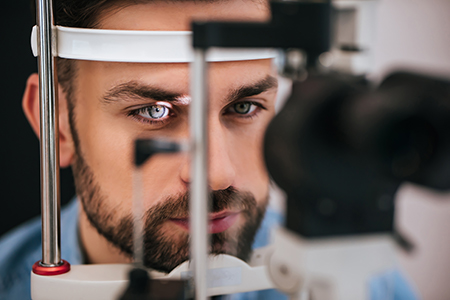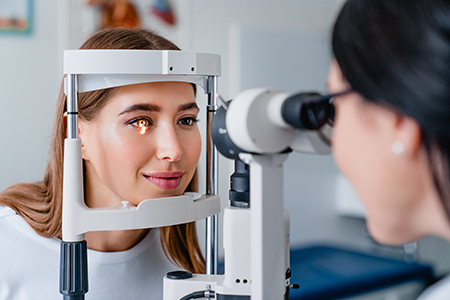


Your eyesight is a precious gift, and protecting against vision loss is essential to maintaining your quality of life. By taking the simple step of making a comprehensive eye examination part of your healthcare routine, you can help safeguard your vision.
As part of a comprehensive eye examination, the office of CN Vision Care will assess your eye health and every aspect of your vision. In addition to determining your proper eyeglass or contact lens prescription, we’ll screen for eye diseases that can lead to vision loss, as well as check for any other problems that may affect eye health. Since your eyes can be an indicator of your overall health, we’ll also look for any warning signs of underlying medical conditions such as high blood pressure, high cholesterol, or diabetes.
It’s also essential for children to have their eyes checked on a regular basis. Periodic eye exams help determine if their vision is developing on schedule and detect any emerging issues that might require treatment.
By scheduling an appointment with the office of CN Vision Care for routine exams and care, we can help you and every member of the family enjoy optimal vision while protecting the health of their eyes.
A comprehensive eye exam provides an in-depth look at the health of your eyes and a thorough assessment of the quality of your vision.
We begin by reviewing your overall medical history and gathering relevant information on your eye health history and that of your family. We’ll also discuss any symptoms you may be experiencing, along with any work-related or environmental conditions that may affect your vision. You’ll then receive a thorough clinical examination to check the health of your eyes and assess the quality of your vision. While taking a close look at your eyes, we perform a series of comfortable tests to determine your visual acuity. We also check the degree to which your eyes work together, how well your eyes follow a moving object, your depth perception, and evaluate other indicators of vision function.
You’ll also be carefully screened for the development of eye diseases that can lead to vision loss. Many eye diseases, including glaucoma, macular degeneration, diabetic retinopathy, as well as other conditions affecting the retina, demonstrate few if any overt signs or symptoms until irreparable damage to your eyesight has occurred. Detecting diseases that can threaten your sight in their earliest stages supports effective management and care.
As surprising as it sounds, your eyes are the only part of the body where blood vessels and nerve tissue can be viewed directly without surgery. For this very reason, a comprehensive eye exam can potentially reveal telltale signs of illnesses and medical conditions that have originated elsewhere in the body. Eye exams can provide critical findings in the diagnosis of congenital syndromes & inherited disorders, primary cancers and metastases, cardiovascular disease, circulatory problems, blood disorders, autoimmune diseases, and infectious diseases, endocrine disorders, or the side effects of certain drugs.
At the office of CN Vision Care, we’re passionate about providing the highest quality of care and dedicated to meeting the vision care needs of every member of your family. We offer a complete range of services, including comprehensive exams, prescription lenses, and contacts, as well as vision screening services to detect any developing conditions affecting the health of your eyes.
Approximately 80% of the information from our environment is gathered and sent for processing by way of our eyes. Healthy vision not only supports the enjoyment of our surroundings, but it also enables us to carry out our daily routines. Comprehensive eye exams performed on a routine basis, or more frequently as recommended, enable the timely correction of vision impairments along with the early detection, management, and treatment of any emerging eye problems.
A comprehensive eye exam involves a series of comfortable and pain-free tests that offer a close-up look at your eye health and visual function. Between having all the tests performed and discussing the results with our eye doctor, you can expect your visit to last up to an hour.
While every patient is different, many of the following tests are typically performed during a comprehensive eye exam:
Visual acuity testing – Measures the sharpness of your vision and how each eye compares to the optimal standard of 20/20 vision
Color blindness testing – Helps to detect hereditary color vision deficiencies or eye health problems that may affect your color vision
Stereoptsis testing – Evaluates how well your eyes work as a team with regard to depth perception and 3D vision.
Eye muscle testing – Checks for eye muscle weakness, poor control, or impaired coordination as your eyes follow a moving object
Pupil testing – Checks how your pupils respond to light
Autorefraction – A computerized test that provides an approximate and preliminary measure of your prescription
Retinoscopy – Uses reflected light to estimate the lens power needed to correct your vision
Refraction – Determines the type and level of refractive error and your exact eyeglass prescription
Keratometry – Measures the shape and curvature of the cornea
Slit-lamp examination – Examines the structure at the front of your eyes along with those farther back within the eye under high magnification
Peripheral Visual Field – Evaluates the integrity of your peripheral vision and checks for blind spots
Intraocular Pressure Measurement – Checks for the presence of glaucoma
Pupil dilation – Dilating the eyes allows for a better view of the back of the eye and its internal structures. It provides a clearer look at the retina, small blood vessels, and the optic nerve. A dilated eye exam offers an opportunity to check for eye diseases such as diabetic retinopathy, glaucoma, and age-related macular degeneration (AMD). This type of exam is essential for individuals at risk for eye disease.
Please note: dilating eye drops take about 20 minutes to work, and your eyes may be sensitive to light for a few hours following your exam. It’s wise to bring sunglasses to your visit or have someone drive you home from the exam.
Although the above tests provide a detailed view of eye health and function, additional evaluation and testing are sometimes indicated. Further testing may include fundus photos, optical coherence tomography, fluorescein angiography, corneal topography, automated visual field, and others. Today, advanced retinal imaging devices can capture high resolution, wide-angle views of the retina, and save these images for comparisons over time.
At the office of CN Vision Care, you can rest assured that your vision care is in the best of hands. We maintain a position at the forefront of advances in technology and treatment to provide patients with the highest quality of care.
Did you know that more than 150 million people in the United States alone wear some form of corrective eyewear to correct refractive errors?
Your eye operates in much the same way as a camera. Just as the lens of a camera focuses the entering light on a piece of film to produce a sharp image, the lens of your eye focuses light on the retina to form a picture that is then sent to the brain. When a refractive error is present, it means that your eye cannot focus light correctly on the retina. A refractive error is a common eye disorder that can occur for a number of reasons; it may be due to an irregularly shaped cornea (the clear front surface of the eye), the length of the eyeball itself, or develop as the lens of your eye ages.
There are a number of symptoms that can be associated with a refractive error. While the most common one is blurred vision, you may also experience other symptoms such as headaches, double vision, eye strain or glare, and halos around light.
Myopia (nearsightedness) – Myopia is the most common refractive error. Most cases of myopia occur because the eyeball is too long, and light is focused before it reaches the retina. It can also be the result of the cornea or the lens being too curved relative to the length of the eyeball.
Hyperopia (farsightedness) – Hyperopia is a refractive error that is due to the eyeball being too short and/or a cornea that is flatter than normal. In cases of hyperopia, it is more challenging to see up-close objects clearly.
Astigmatism – Astigmatism is due to an irregularly shaped cornea or lens. In cases of astigmatism, the eye is unable to evenly focus light on the retina to produce a clear image. Astigmatism may occur in conjunction with myopia or hyperopia.
Presbyopia – Presbyopia is a refractive error that affects the majority of individuals over the age of 40. It occurs with advancing age as the lens of the eye loses its elasticity, and its ability to focus. With presbyopia, it is more difficult to see up close.
Refractive errors can be readily detected during the course of an eye exam. To do this, we’ll have you read a vision chart as well as perform tests to assess how the light bends as it travels through the cornea and the lens of your eye. Once it is determined that a refractive error is present, we’ll determine the exact prescription needed to correct your vision.
In the old days, the only way to correct refractive errors was by wearing eyeglasses. While wearing a pair of eyeglasses remains an excellent and fashionable way to enjoy clear, crisp vision, choosing contact lenses or refractive surgery to alter the cornea's shape can also effectively correct some vision impairments.
Based on your specific needs and lifestyle, our office will guide you in choosing the safest and most appropriate treatment to maintain the health of your eyes and the quality of your vision.
As everyone knows, the health of your eyes is essential to your overall function and quality of life. Yet despite the desire to ward off the effects of aging, much like everything else in the body, your eyes and vision are not immune to the changes that come with time. At the office of CN Vision Care, we do our utmost to help you protect the health of your eyes and preserve the quality of your vision throughout every stage of life.
While the need for reading glasses in middle age is typically part and parcel of the aging process, there may be other emerging vision changes that are indicative of more serious eye conditions. With advancing age, your risk of eye disease significantly increases. In addition to glaucoma, age-related macular degeneration, diabetic retinopathy, and cataracts, the incidence of problems such as dry eye, floaters, and retinal detachment also occur with greater frequency in older adults. As a matter of fact, by the age of 65, one in three seniors are affected by an eye condition that results in vision impairment.
Since many eye diseases develop without discomfort, routine eye care is essential. For this reason, a baseline eye exam is recommended at the age of 40. By performing an examination at this time, our office can detect eye disease and vision problems early in their onset, when treatment and management to preserve your eyesight are most effective. And, while annual eye exams are essential for older adults, if you are under the age of 40 and have a family history of either glaucoma or macular degeneration or suffer from systemic conditions such as diabetes or high blood pressure, it’s also important to get your eyes routinely checked.
Taking your child for a comprehensive eye exam at an early age and maintaining the recommended eye care schedule as they grow is the best way to ensure your child's vision development and that they acquire the visual skills needed to fully participate in all their activities.
According to guidelines established by the American Optometric Association, children should receive an eye exam at between 6 months to 12 months of age, once between the ages of 3 and five, before entering first grade and then annually thereafter. However, in the presence of certain risk factors or diagnosed vision issues and impairments, the recommended exam schedule may differ.
At the office of CN Vision Care, we provide skilled and experienced vision care for children and do our very best to make sure they enjoy optimal vision as they grow. Our specialized pediatric eye care services include child-friendly and age-appropriate exams to check visual acuity, eye tracking, focusing skills, and problems such as nearsightedness, farsightedness, lazy eye (amblyopia), crossed eyes, dyslexia, color blindness, disease or medical conditions. Depending upon the findings at your child’s eye exam visit, eyeglasses, vision therapy, or additional procedures will be prescribed as needed.
Even if your vision is 20/20, it’s essential to keep in mind that everyone requires a comprehensive eye exam periodically. Nonetheless, how often you or a member of your family should have one depends on several factors. A patient’s age, family and personal medical histories, a previous eye injury, existing eye conditions, and environmental or occupational factors influence the recommended frequency.
The American Optometric Association offers the following guidelines:
Children – Children should receive an eye exam at between 6 months to 12 months of age, once between the ages of 3 and five, before entering first grade and then annually thereafter. However, in the presence of certain risk factors or diagnosed vision issues and impairments, the recommended exam schedule may differ.
Adults – In the absence of risk factors, adults between the ages of 18 to 39 years should schedule an eye exam at least once every two years. Because several eye diseases can develop with age, a baseline eye exam is recommended at the age of 40. A patient’s risk factors determine the recommended schedule between the ages of 40 and 64 years. At-risk adults over 40 may require annual or more frequent eye exams. For low-risk adults, the eye doctor may determine that an exam every two years may suffice. For adults 65 and older, annual exams are recommended.
It’s essential to remember to bring your current eyeglasses or contact lenses prescription to your visit. If you also wear reading glasses, computer glasses, protective eyewear, or other visual aids, you may want to bring these as well. Because getting your pupils dilated can leave you sensitive to light for several hours following your appointment, it’s wise to bring sunglasses to the appointment.
In addition to your medical and eye health history, you will be asked about your family’s eye health history and any contributing factors that may increase your risk of eye disease. As best you can, be prepared with this information. It’s also helpful to have a comprehensive list of any medications that you are taking. Remember to bring your medical insurance and vision insurance card and information along to your visit.
If you have questions or concerns about your eye health and vision, an eye exam visit offers an excellent opportunity to discuss what's on your mind and get helpful eye care tips and guidance.
It’s essential to keep in mind that vision screenings take a very basic look at your eyesight and are not used to diagnose or treat vision problems. They are designed to merely detect them and are often performed by a school nurse or pediatrician. While a vision screening may be useful in identifying a vision impairment that requires further care, it is by no means a substitute for a comprehensive eye exam. As a rule, the only way to precisely detect and diagnose any vision abnormalities or identify the presence of eye disease is through a comprehensive and in-person eye exam.
If you have vision insurance, you can expect to have coverage for some aspects of care. While every vision plan offers specific benefits, they generally offer some coverage for routine care such as annual exams and eyewear. If your eye condition qualifies as a medical issue, some coverage under your medical insurance may apply. At the office of CN Vision Care, we strive to optimize your insurance benefits and minimize your out-of-pocket expenses. Although our financial office is well versed in the complexities of insurance coverage, it’s always a good idea to review your specific benefits with your HR department or insurance carrier.
At the office of CN Vision Care, we welcome patients of all ages and offer a comprehensive range of vision care services and products to help every member of your family protect the health of their eyes and enjoy optimal sight. We use the most advanced technology and proven treatment methods to deliver precise, gentle, and effective care. Whether you or any member of your family require an eye exam, prescription lenses, protective eyewear, contacts, and hard-to-fit contact lenses to pre and post-LASIK care or other eye care services, we’re well equipped to help.
For more information on our office and the many services we provide, give us a call today.



